Cannabis in Oregon
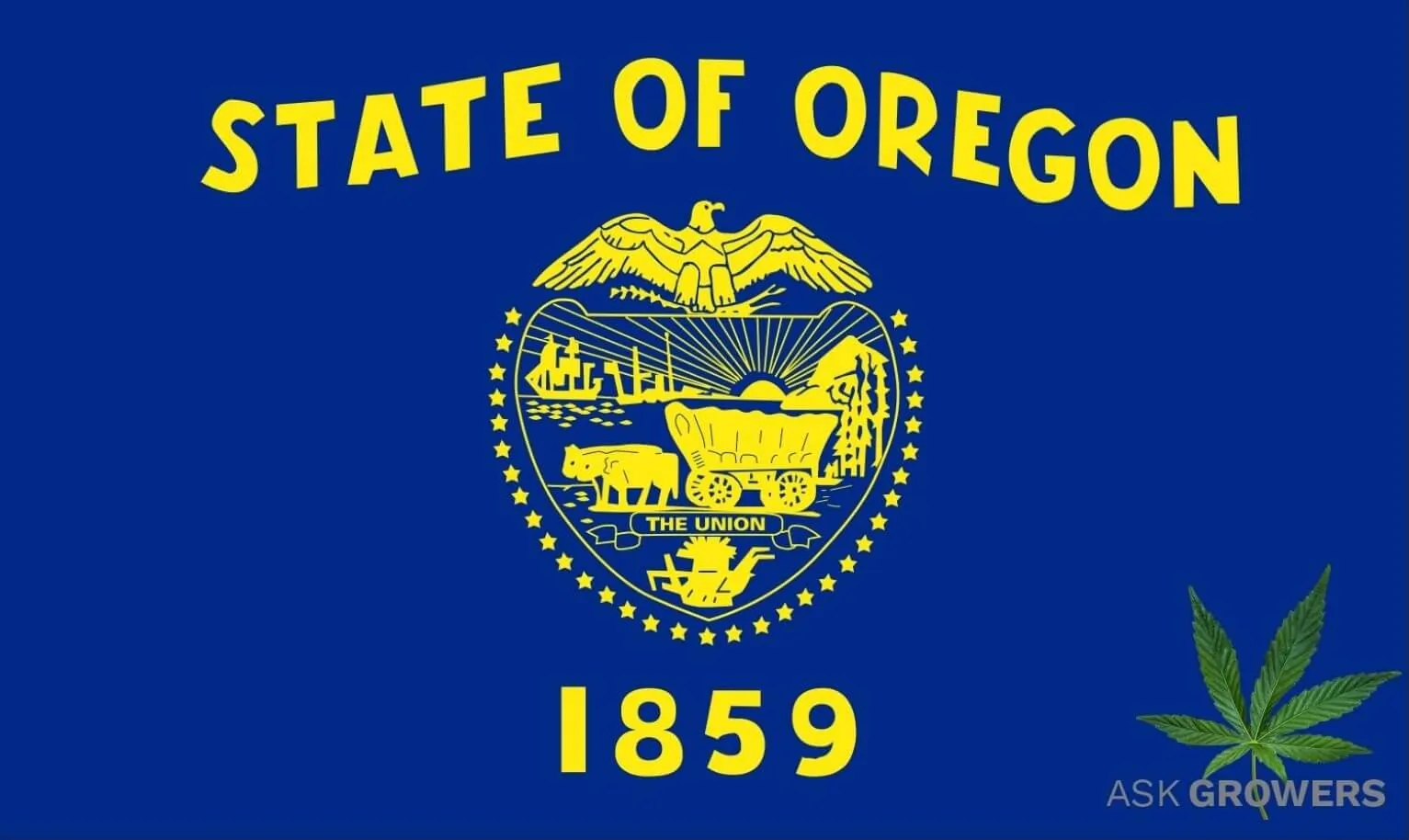
Non-medical cannabis legalization took place in Oregon more than 5 years ago. The state had enough time to establish all recreational laws and put them into effect. With this review, you’ll discover the current state of things and marijuana laws in 2023.
Is Weed Legal in Oregon?
The history of hash decriminalization in Oregon traces back to 1973 when the possession of small amounts of hash became treated not as a serious crime but similar to a traffic offense. Now, both non-medical and medical marijuana (MMJ) is legal here. In 1998, the state approved the Medical Marijuana Act, which allowed patients with qualifying conditions to buy marijuana products in weed shops near their home. Then, the voters approved the Measure that legalized recreational cannabis in 2014. Recreational marijuana provision centers were open for all adult individuals in 2015.
Buying Marijuana in Oregon?
Talking about marijuana possession laws in Oregon, it should be highlighted that they are different depending on whether you carry cannabis in public or keep it at home. Here is a list of products that Oregon citizens can possess outside of their houses and buy at dispensaries:
| Recreational users |
| 1 oz. of flowers |
| 1 oz. of concentrates/extract (5 grams as a daily purchase maximum) |
| 16 oz. of hash solid products (edibles) |
| 72 oz. of cannabis liquid products (tinctures) |
| 10 marijuana seeds |
| 4 immature plants (per household) |
Recreational users 21 and older can store up to 8 oz. (32 oz./per month) of pot within their residences, while other in-house possession caps are the same as in public.
Read Also: How To Buy Recreational Marijuana
For medical purposes concentration limit is 4,000 mg THC per container (for any type of cannabinoid product other than edibles or topicals). As of 2016, registered patients can purchase as many cannabis seeds and immature plants as a dispensary can sell. To buy cannabis in Oregon, you should be an approved patient, a designated caregiver, or an adult of 21. Bring your photo ID (and a medical marijuana card for qualified patients) if you are making a purchase at a dispensary. Note that some dispensaries choose to serve only medical consumers. All recreational sales are under the control of the Oregon Liquor Control Commission (OLCC) and take place in its licensed stores. Similar to Colorado, Oregon cities and counties have the right to determine if they allow recreational cannabis sales or not. This means that a county can ban cannabis sales, but certain cities in this county may have operational marijuana stores (or vice versa). Adults of 21 are allowed to possess legal marijuana regardless of the fact if the city restricts pot sales or not. Under current marijuana laws, licensed marijuana provision centers are authorized to operate from 7 a.m. to 10 p.m., but store owners can work at any time within this frame. Check the exact opening and closing time in advance. Medical marijuana delivery services are permitted in the state. Recreational marijuana delivery is also available in some Oregon cities but not in all. The state marijuana stores offer a variety of products for sale: flowers, plants, seeds, concentrates, topicals, tinctures, edibles, extracts, and other products that contain cannabinoids.
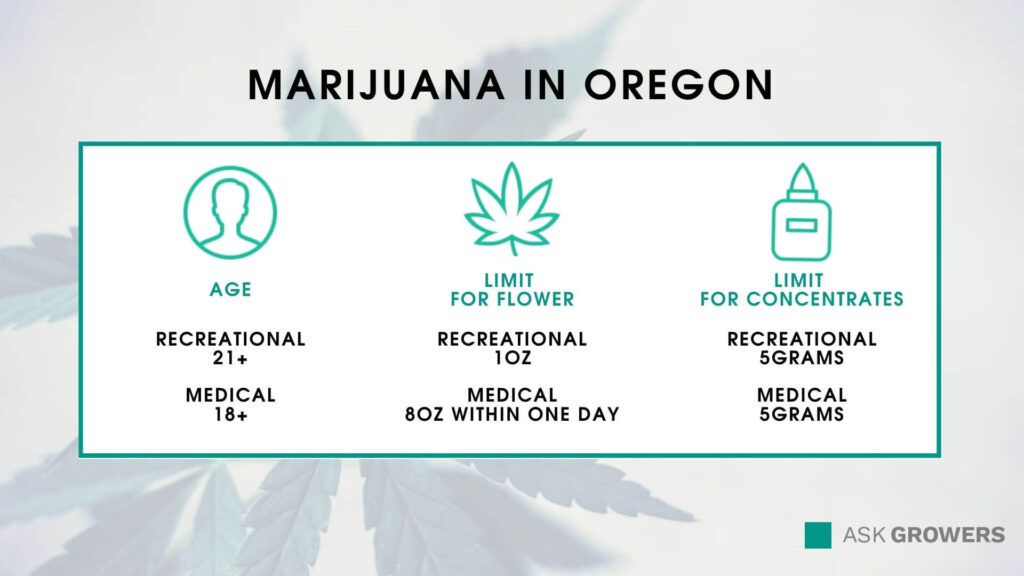
Cannabis Consumption in Oregon
The state allows marijuana consumption only within your private house or on your friend’s/neighbor’s/relative’s property out of the public eye. Any public use is prohibited. Many local businesses follow the Indoor Clean Clear Act banning both smoking and vaping, so even discreet cannabis vaping is not permitted. Check the places where you cannot consume pot:
- any public places;
- schools;
- hotels;
- buses/planes;
- sidewalks;
- outdoor smoking areas;
- bars/restaurants;
- shopping malls;
- community parks/recreation centers;
- cars;
- federal lands.
Since marijuana is considered a Schedule Ι drug, it is outlawed for use in national parks and forests, in military bases, next to national monuments, in federal courthouses, and other properties governed by federal agencies (for example, the National Parks Service, the Bureau of Land Management, etc.). The violation of these rules leads to huge fines and jail time. Legal adults can also give away, share, gift, and receive marijuana free of charge within the state.
Taxes on Marijuana in Oregon
Hash for medical and recreational use is taxed differently. Non-medical consumers are subject to a 17% tax on retail sales plus a 3% sales tax imposed by counties on a local level. Marijuana for approved patients is exempt from any taxes.
Oregon Medical Marijuana Card
After the medical cannabis program has become effective, individuals with qualifying diseases can legally buy marijuana products for treatment purposes and grow pot herbs at home. With a cannabis card, Oregon patients can get legal marijuana with significant discounts. Unfortunately, Oregon doesn’t honor out-of-state medical cards and doesn’t offer a reciprocity program for non-residents. The cardholders who are visiting the state cannot gain benefits from shopping in local cannabis stores.
How to Get a Medical Marijuana Card in Oregon
If you need pot for your treatment therapy, you can become a state registered patient. Obtaining an MMJ card goes with certain bonuses like an opportunity to buy more cannabis and pay less taxes. Learn about the rules on how to be qualified under the program in Oregon.
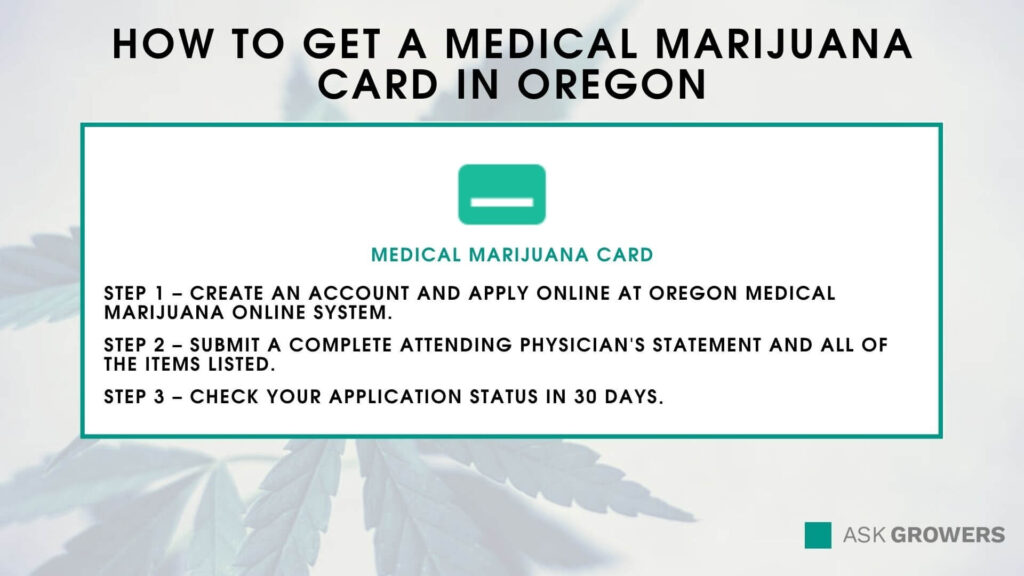
Diseases
Patients who are diagnosed with any of the following conditions/diseases can be qualified as individuals for obtaining an MMJ card:
- glaucoma;
- cancer;
- post-traumatic stress disorder;
- weight-loss disease;
- HIV/AIDS;
- Alzheimer’s disease;
- degenerative neurological condition;
- severe pain;
- nausea;
- seizures by epilepsy or other diseases;
- muscle spasms by multiple sclerosis or other diseases.
The licensed physician can propose another disease for approval if he/she deems cannabis therapy beneficial for a patient diagnosed with this disease.
Patient qualifications
All applicants for the Oregon Medical Marijuana Program should:
- be 18 years old;
- reside in Oregon;
- be qualified with a debilitating disease from the qualifying list above;
- get an Attending Physician’s statement.
The medical marijuana laws permit minors to participate in the program and appoint a caregiver who will help them in cannabis use and will buy the corresponding products in a dispensary.
Patient registry process
There are 2 ways to get a cannabis card – to send an application through the mail or to apply online. Most patients select the online route since it is easier and faster. In this case, your steps are the following:
- after creating an online account, submit all requested documents (copies of your photo ID/driver’s license, proof of Oregon residency);
- fill out and submit an application form;
- attach a doctor’s statement form obtained from a licensed physician;
- attach copies of current IDs for your grower/caregiver, if necessary;
- cover a $200 application fee (there are also reduced fee options for certain applicants);
- print out a 30-day receipt that you can use as a temporary MMJ card.
It takes the program a month to verify your documents and approve an MMJ card. Within this time period, you can access local dispensaries using a receipt, which doesn’t extend to your caregiver. The registry process for veterans and minors is slightly different. 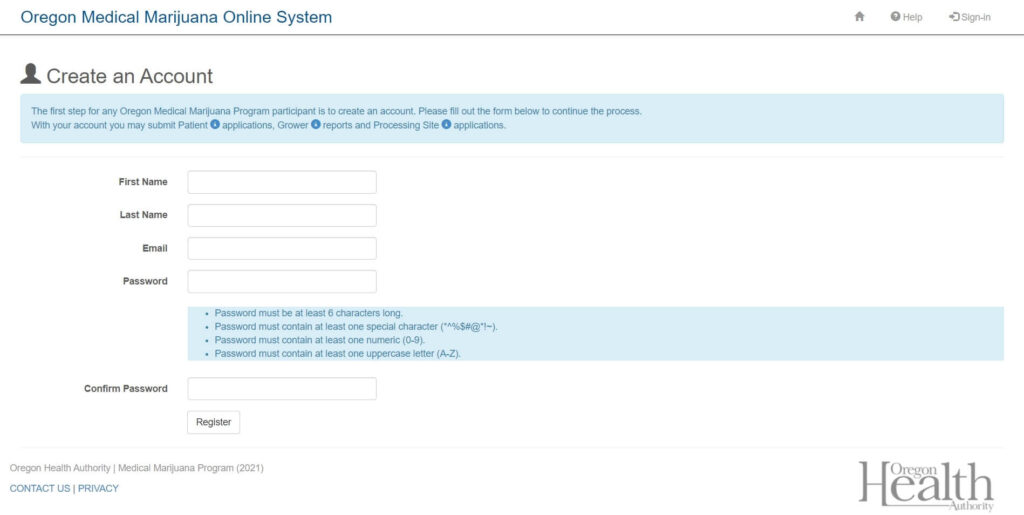
Caregiver qualifications
Certain adult patients and MMJ minors under 18 can determine a caregiver who will help them with cannabis purchase, consumption, and plant growth. If you want to act as a designated caregiver, you should be 21 years old and reside in Oregon.
Transporting Marijuana in Oregon
Adults can transport 1 oz. of legal cannabis in a motorized vehicle (differ for certified cannabis growers). The products should be kept in a locked box in the trunk of the car or in any other place away from the driver’s reach. Driving a car or riding a bike under the influence of marijuana is taken by law enforcement officers seriously and can be punished with a steep fine and incarceration. Remember that THC traces can be detected in the consumer’s blood for 30 days. Any amount of THC present in the driver’s blood is considered a crime. It will be hard for you to prove if you have smoked before or while driving.
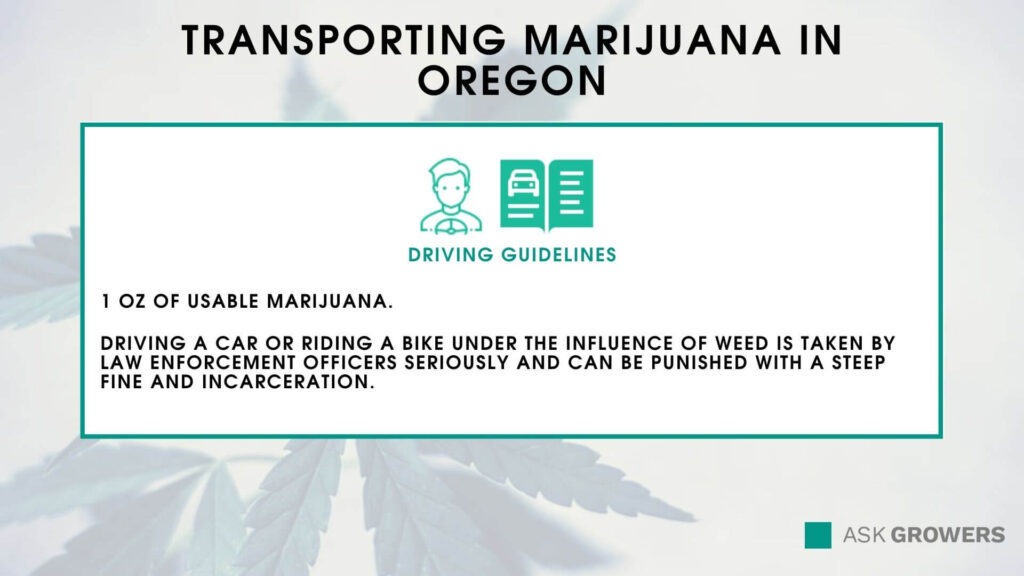
Exporting Marijuana
Marijuana is outlawed on a federal level. It is illegal to transport hash on waterways or between the states even if neighboring states like Washington and California don’t ban recreational marijuana consumption. Passengers are allowed to transport a legal amount of pot while they are flying within the USA, but when flying out of the state, they’ll be asked to dispose of cannabis before boarding.
Growing Marijuana
Legal adults of 21 and medical MMJ users are permitted to grow pot at home. Cultivation should be done within or outside a private house away from the public. The flowers must be hidden with the help of any barrier (for example, a tall fence). The growing limit for recreational users is 4 plants per person and per household regardless of how many individuals reside in the house. The cultivation cap for approved patients is 6 mature and 18 immature flowers. You are not allowed to grow cannabis if your growing site is 1,000 feet away from a school. Before becoming a marijuana grower, a person should receive a state grow site registration card and a state grower card. In addition, the Oregon Medical Marijuana Program performs a criminal background check on all growers designated by MMJ patients. Individuals who have more than 1 conviction are forbidden to grow marijuana. Designated growers are required to pay a grow site registration fee ($200).
Popular strains for growing:
Licensing for Growers, Manufacturers, Processors, Retailers, Etc.
The OLCC controls regulatory oversight and licensing of the recreational cannabis market, while the Oregon Health Authority oversees the regulation and licensing of the MMJ program. The OLCC accepts applications for 4 types of commercial use licenses:
- production;
- processing;
- wholesale;
- retail.
Currently, the OLCC is not processing applications for new producer licenses. This moratorium remains active till January 2022.
Read Also: Researching the Cannabis Industry in Oregon
Sources
https://norml.org/laws/oregon-penalties/
https://www.oregon.gov/oha/ph/PreventionWellness/marijuana/Pages/laws
https://www.oregon.gov/olcc/marijuana/Pages/Frequently-Asked-Questions
https://www.osbar.org/public/legalinfo/Marijuana-Law
https://wikipedia.org/wiki/Cannabis-in-Oregon
https://www.portlandoregon.gov/police/71570
https://www.orcity.org/planning/marijuana-regulation-faqs
https://ballotpedia.org/Oregon-Amend-Recreational-and-Medical-Cannabis-Laws-Initiative-(2020)

 Guides
Guides

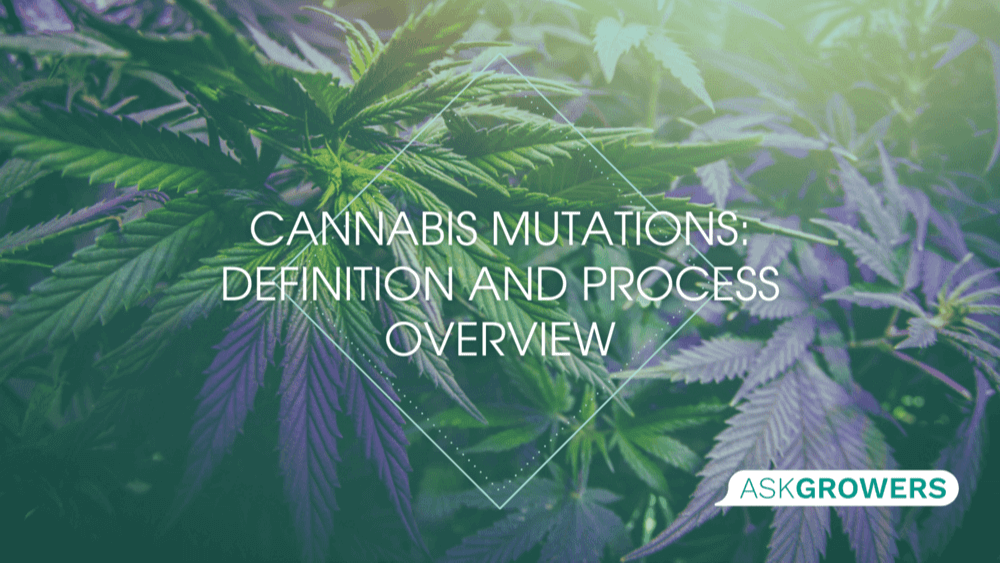
.png)
.png)



 (1).png)

.jpg)
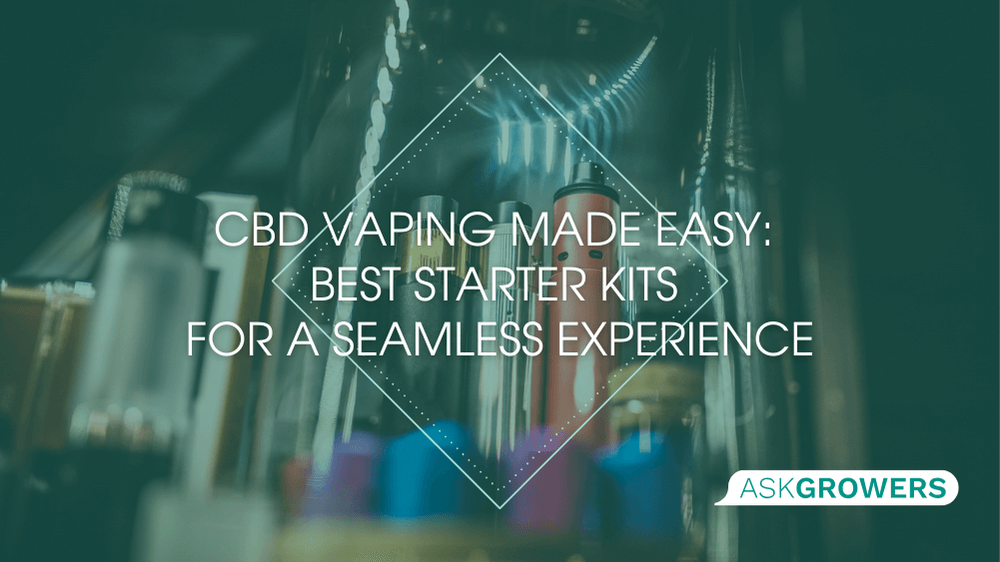
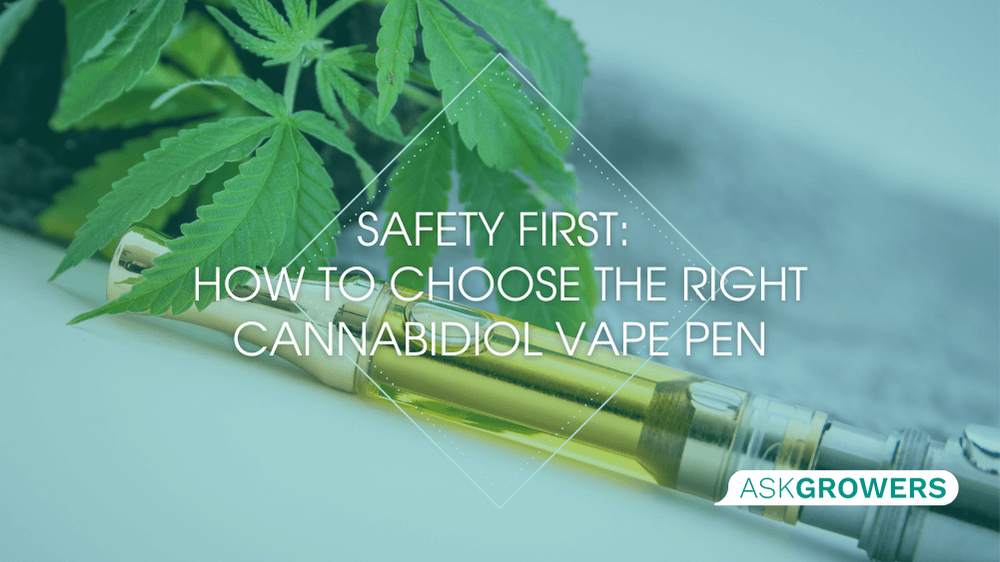
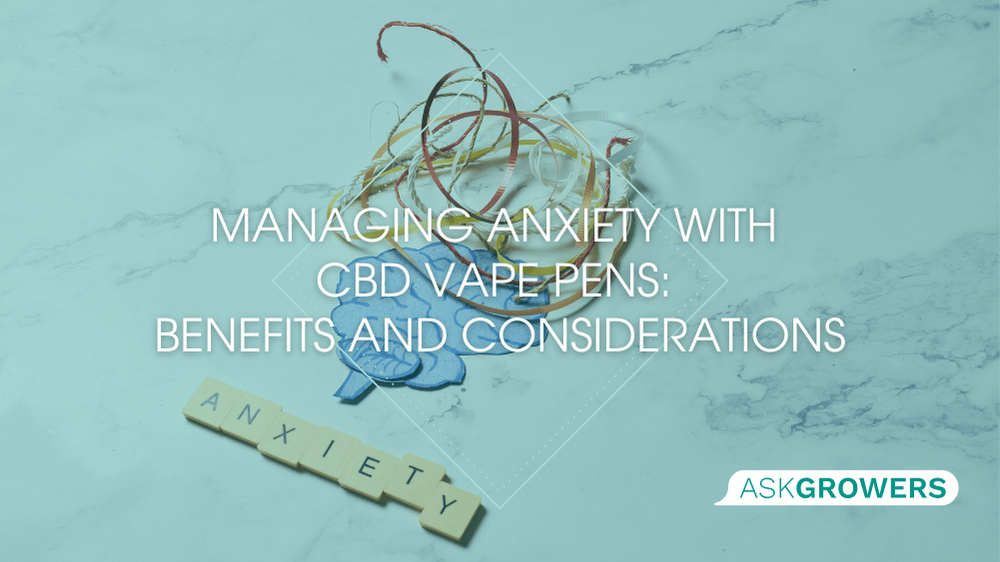


Be the first and share your opinion
Write a Review